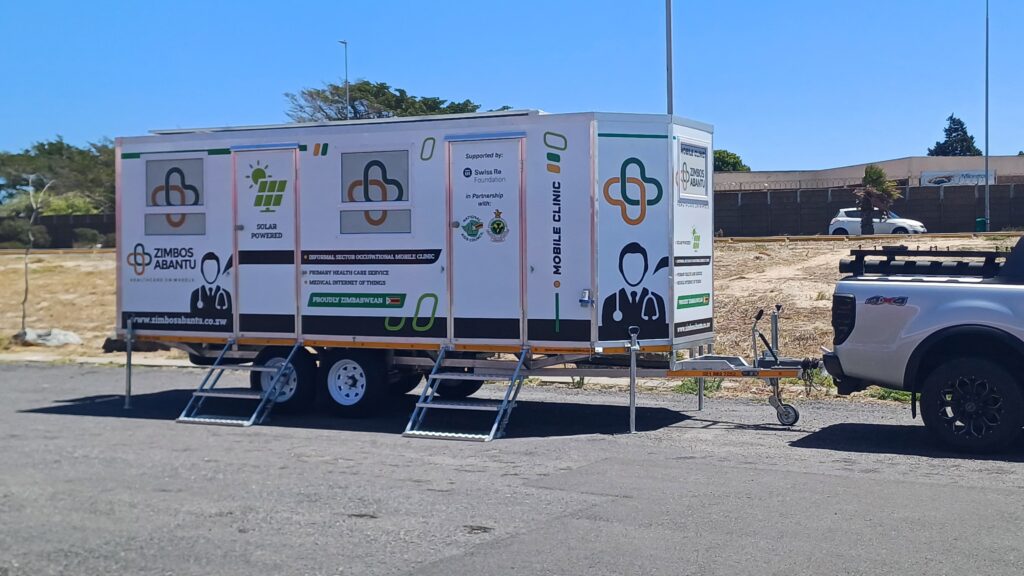ZimbosAbantu, Zimbabwe’s technological and inclusive healthcare provider has revealed its solar-powered mobile clinics in Zimbabwe to improve the healthcare of the citizens.
In Zimbabwe, majority of the population live in rural areas where access to healthcare is limited by distance, cost, and infrastructure deficit. People walk 15 to 20 kilometers to reach the nearest clinic, often delaying care until it’s too late.
Chiedza Mushawedu, co-founder and executive director of ZimbosAbantu Healthcare on Wheels, witnessed these challenges while working for a private hospital in 2016. “We were seeing preventable deaths from treatable conditions, mothers giving birth at home without skilled assistance, and people living with undiagnosed chronic illnesses simply because care was out of reach,” Chiedza explains.
In 2021, Chiedza founded ZimbosAbantu to improve healthcare access in these communities. By repurposing vans into solar-powered, tech-enabled mobile clinics, the startup brings healthcare directly to those who need it most. Chiedza says her team has cut walking distances from an average of 15 kilometers to just three, making early diagnosis and treatment possible right where people live.
ZimbosAbantu currently operates ten mobile clinics, each strategically deployed to reach communities with the greatest need. According to Chiedza, each clinic is a fully equipped unit built to operate in off-grid areas. The clinics are powered by solar panels with battery backups, fitted with refrigeration for vaccines and medicines, and include a compact diagnostic lab called Healthcube, a portable device that performs over a dozen essential tests including blood glucose, hemoglobin, and malaria.
Chiedza explained that getting a clinic operational requires a combination of resources, infrastructure, and people. Each unit costs about US$120,000 to set up, she said. The units provide primary healthcare, maternal and child services, dental and eye care, immunizations, HIV testing, and NCD screenings for hypertension and diabetes. “We prioritised services that address the most common community health needs while remaining cost-effective and portable,” Chiedza said. For more complex cases, patients are referred to partner hospitals under the supervision of the Ministry of Health and Child Care.
Patients first engage with community health mobilisers who serve as ambassadors, receiving basic health education and on-spot blood pressure checks. Once they arrive at the clinic, they’re registered digitally. “We build a digital health record for every patient, something many are experiencing for the first time,” Chiedza says. The data helps track chronic illnesses like diabetes and hypertension, enabling continuity of care even when the clinic moves to another location.
Next, the patient moves to triage, where vitals are checked. From there, they’re directed to the consultation area, where a nurse or doctor conducts an assessment and offers a diagnosis. If medication is required, they receive it immediately from the solar-powered pharmacy fridge or dispensary, and if necessary, a follow-up visit is scheduled during the next mobile clinic visit.
The vans are designed with accessibility in mind, featuring ramps for people with disabilities, private consultation spaces and staff trained on gender sensitivity.
On an average day, each van serves between 18 and 25 patients, maintaining quality while ensuring reach. “Our goal is to bring healthcare within one kilometer of every household in the communities we serve,” Chiedza notes.
Beyond patient numbers, ZimbosAbantu measures its impact through a robust data-driven system that tracks 18 core health metrics daily, weekly, monthly, or annually. These indicators span the full HIV and NCD cascade, from preventive health and screening to chronic care and palliative support.
“We don’t just count patients; we track outcomes,” Chiedza explains. “Our data allows us to understand trends in maternal health, vaccination coverage, chronic disease management, and behavior change around sexual and reproductive health.”
The organisation monitors patients served, maternal health visits, immunisations, NCD screenings, HIV testing, and follow-up care, using this data to improve services. They also contribute data to the national health repository, informing government health financing and advocacy. “The evidence we have gathered since 2021 has shown real impact,” she says, pointing to partnerships with local and global health institutions drawn by their results.
To strengthen clinical decisions in real time, ZimbosAbantu partners with Econet Wireless to provide telemedicine connectivity. Nurses can instantly consult remote doctors, improving the doctor-to-patient ratio and ensuring accurate diagnosis. “Through technology, we connect rural clinics to qualified doctors in cities, allowing our nurses to provide the right care faster,” Chiedza adds.
In regions with low connectivity, real-time data capture can be difficult. ZimbosAbantu mitigates this using solar-powered systems, offline-first health software, and cloud-based encryption to protect patient information. Portable devices such as ultrasounds and glucometers sync automatically when internet access returns.




